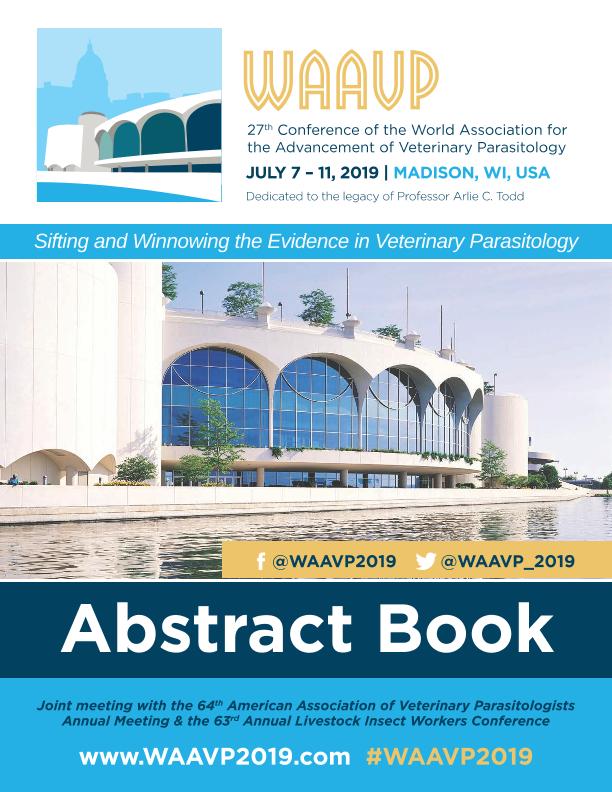Evento
Evolution of the efficacy of a combined moxidectin-levamisole treatment against resistant gastrointestinal nematodes in lambs
Luque, Sonia Elisabet ; Lloberas, Maria Mercedes; Cardozo, Patricia Alejandra; Lanusse, Carlos Edmundo
; Lloberas, Maria Mercedes; Cardozo, Patricia Alejandra; Lanusse, Carlos Edmundo ; Virkel, Guillermo Leon
; Virkel, Guillermo Leon ; Farias, Cristina Elena
; Farias, Cristina Elena ; Viviani, Paula
; Viviani, Paula ; Lifschitz, Adrian Luis
; Lifschitz, Adrian Luis ; Alvarez, Luis Ignacio
; Alvarez, Luis Ignacio
 ; Lloberas, Maria Mercedes; Cardozo, Patricia Alejandra; Lanusse, Carlos Edmundo
; Lloberas, Maria Mercedes; Cardozo, Patricia Alejandra; Lanusse, Carlos Edmundo ; Virkel, Guillermo Leon
; Virkel, Guillermo Leon ; Farias, Cristina Elena
; Farias, Cristina Elena ; Viviani, Paula
; Viviani, Paula ; Lifschitz, Adrian Luis
; Lifschitz, Adrian Luis ; Alvarez, Luis Ignacio
; Alvarez, Luis Ignacio
Tipo del evento:
Conferencia
Nombre del evento:
27th Conference of the World Association for the Advancement of Veterinary Parasitology
Fecha del evento:
07/07/2019
Institución Organizadora:
World Association for the Advancement of Veterinary Parasitology;
Título del Libro:
27th Conference of the World Association for the Advancement of Veterinary Parasitology: Abstract Book
Título de la revista:
Proceedings of the "27 th. International Conference of the World Association of the Advancement of Veterinary Parasitology"
Editorial:
World Association of the Advancement of Veterinary Parasitology
Idioma:
Inglés
Clasificación temática:
Resumen
Nematodicidal combinations can be a valid strategy to achieve effective nematode control in thepresence of drug resistance. The aim of the current trial was to evaluate the pharmaco-parasitological outcome after the continuous use of moxidectin (MXD) and levamisole (LEV) as acombined treatment in lambs naturally parasitized with ivermectin-resistant gastrointestinalnematodes. Forty (40) lambs were divided into four groups (n=10): untreated control andsubcutaneously treated with either MXD (0.2 mg/kg), LEV (8 mg/kg) or with MXD+LEV (0.2and 8 mg/kg, respectively). Blood samples were collected at different times up to 1 (LEV) or 14(MXD) days post-treatment. LEV and MXD plasma concentrations were measured byHPLC. Faecal samples were collected on days 0, 7, and 14 post-treatment to perform the faecalegg count reduction tests (FECRT). No significant pharmacokinetic (PK) adverse changes wereobserved for either MXD or LEV after their co-administration in sheep. The clinical efficacy ofthe MXD+LEV combination was evaluated after its continuous use (3 treatments/year) over five(5) years at the same farm. The initial anthelmintic efficacies (1 st year) were 99% (MXD), 85%(LEV) and 100% (MXD+LEV). Following repeated annual treatments over five years, theclinical response for the combined treatment reached 87% efficacy. The combination reachedefficacies of 100% (1 st year) and 98.5% (5 th year) against Haemonchus contortus. Teladorsagia spp. and Trichostrongylus spp. were the main nematode genera surviving theindividual and combined treatments. The co-administration of MXD+LEV during five yearsresulted in a significant higher anthelmintic effect compared to MXD or LEV given alone. Evenwhen MXD and LEV individual efficacies were reduced during the five-year period, thecombined treatment maintains acceptable efficacy levels against H. contortus.
Palabras clave:
Moxidectin
,
Levamisole
,
Resistant Gastrointestinal Nematodes
,
Lambs
Archivos asociados
Licencia
Identificadores
Colecciones
Eventos(CCT - TANDIL)
Eventos de CTRO CIENTIFICO TECNOLOGICO CONICET - TANDIL
Eventos de CTRO CIENTIFICO TECNOLOGICO CONICET - TANDIL
Eventos(CIVETAN)
Eventos de CENTRO DE INVESTIGACION VETERINARIA DE TANDIL
Eventos de CENTRO DE INVESTIGACION VETERINARIA DE TANDIL
Citación
Evolution of the efficacy of a combined moxidectin-levamisole treatment against resistant gastrointestinal nematodes in lambs; 27th Conference of the World Association for the Advancement of Veterinary Parasitology; Wisconsin; Estados Unidos; 2019; 320-321
Compartir



